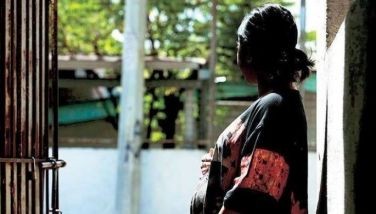Environmentalist hits detergent companies
July 29, 2001 | 12:00am
An advocate of the environment yesterday hit the Soap and Detergent Association of the Philippines (SDAP) for "deliberately omitting other vital facts" to mislead the public on the hazards of soaps and detergents products’ surface active agents (surfactants).
Ester Perez de Tagle, founder of the Concerned Citizens Against Pollution (COCAP), said the SDAP failed to inform consumers about the growing concern in Europe and Nordic States about the use of the petroleum-based linear alkyl benzene sulphonate (LABS).
SDAP, an industry organization led by the world’s giant detergent companies, last Monday put out an advertisement in a major daily making sweeping claims of biodegradability and non-toxicity of its preferred surfactant, the LABS.
The detergent manufacturers also sued the Philippine government for the continued implementation of Executive Order 259, the 14-year-old law mandating the minimum use (60 percent) of local coconut oil-based surfactants.
There are three kinds of surfactants in the Philippines: the hard alkyl benzene sulphonate (HABS); LABS, a derivative of HABS; and the local coconut oil-based fatty alcohol sulfate or CFAS. Last year, the government imposed a ban on HABS.
World studies have shown that HABS is strictly non-biodegradable in any given condition of the water – aerobic (with oxygen) or anaerobic (without oxygen). LABS, on the other hand, is slowly biodegradable in aerobic state, while CFAS degenerates readily into simpler carbon atoms in both conditions of the water.
"The SDAP-commissioned study mentioned in the ad was deemed inadequate by government and academic authorities and even its researchers admitted to the weakness in the methodologies they used, especially in the collection of samples done only in favorable sites of the river system and during the rainy season when undegraded LABS are swept into the open sea," de Tagle disclosed.
De Tagle noted that Nordic countries composed of Sweden, Finland, Norway and Denmark have urged their citizens not to use products containing LABS. the Nordic Swan Label is not issued to soap and detergents that contain LABS because authorities deem the surfactant from gasoline as non-biodegradable and toxic.
She added Denmark, the country that has been granting monetary support to the Philippines to save the Pasig River, promulgated its own EO 823 to limit the presence of LABS in their sludge or the muddy residue of wastewater treatment. The Danish government established LABS as toxic to soil’s beneficial worms and bacteria and to marine life, particularly to blue mussels.
The COCAP founder also said England has banned another petroleum-based surfactant, the alkyl phenyl ethoxylates, for altering the genetic structure of some species of fish. The surfactant is regarded as a "gender bender."
"The world is now starting to veer away from fossil fuel or petroleum, not only because of its depleting sources, but also due to its ecological impact. If the hard alkyl benzene sulphonate (HABS), the relative surfactant of LABS, has been banned by more than 60 countries thirty years ago, LABS will surely meet the same fate," she stated.
Informed courses said some multinational companies have threatened to pull out their plants in the Philippines if government will insist on implementing EO 259.
"If multinational companies will close shop, Filipino investors can fill the slack in the very lucrative detergent market. To protect our dying environment, our government must ensure that only EO 259 compliant products should be sold in our country," de Tagle emphasized.
Ester Perez de Tagle, founder of the Concerned Citizens Against Pollution (COCAP), said the SDAP failed to inform consumers about the growing concern in Europe and Nordic States about the use of the petroleum-based linear alkyl benzene sulphonate (LABS).
SDAP, an industry organization led by the world’s giant detergent companies, last Monday put out an advertisement in a major daily making sweeping claims of biodegradability and non-toxicity of its preferred surfactant, the LABS.
The detergent manufacturers also sued the Philippine government for the continued implementation of Executive Order 259, the 14-year-old law mandating the minimum use (60 percent) of local coconut oil-based surfactants.
There are three kinds of surfactants in the Philippines: the hard alkyl benzene sulphonate (HABS); LABS, a derivative of HABS; and the local coconut oil-based fatty alcohol sulfate or CFAS. Last year, the government imposed a ban on HABS.
World studies have shown that HABS is strictly non-biodegradable in any given condition of the water – aerobic (with oxygen) or anaerobic (without oxygen). LABS, on the other hand, is slowly biodegradable in aerobic state, while CFAS degenerates readily into simpler carbon atoms in both conditions of the water.
"The SDAP-commissioned study mentioned in the ad was deemed inadequate by government and academic authorities and even its researchers admitted to the weakness in the methodologies they used, especially in the collection of samples done only in favorable sites of the river system and during the rainy season when undegraded LABS are swept into the open sea," de Tagle disclosed.
De Tagle noted that Nordic countries composed of Sweden, Finland, Norway and Denmark have urged their citizens not to use products containing LABS. the Nordic Swan Label is not issued to soap and detergents that contain LABS because authorities deem the surfactant from gasoline as non-biodegradable and toxic.
She added Denmark, the country that has been granting monetary support to the Philippines to save the Pasig River, promulgated its own EO 823 to limit the presence of LABS in their sludge or the muddy residue of wastewater treatment. The Danish government established LABS as toxic to soil’s beneficial worms and bacteria and to marine life, particularly to blue mussels.
The COCAP founder also said England has banned another petroleum-based surfactant, the alkyl phenyl ethoxylates, for altering the genetic structure of some species of fish. The surfactant is regarded as a "gender bender."
"The world is now starting to veer away from fossil fuel or petroleum, not only because of its depleting sources, but also due to its ecological impact. If the hard alkyl benzene sulphonate (HABS), the relative surfactant of LABS, has been banned by more than 60 countries thirty years ago, LABS will surely meet the same fate," she stated.
Informed courses said some multinational companies have threatened to pull out their plants in the Philippines if government will insist on implementing EO 259.
"If multinational companies will close shop, Filipino investors can fill the slack in the very lucrative detergent market. To protect our dying environment, our government must ensure that only EO 259 compliant products should be sold in our country," de Tagle emphasized.
BrandSpace Articles
<
>
- Latest
- Trending
Trending
Latest
Trending
Latest
Recommended































